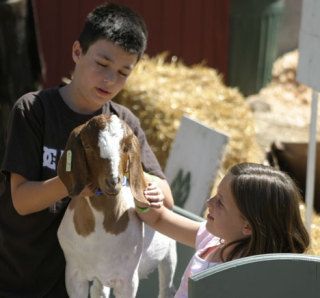LANGLEY — Chevon, French for goat meat, is making its debut at this year’s Island County Fair.
Nine meat goats raised in Island County will be auctioned today starting at noon, a first for the fair.
“We’ve raised chickens and normal goats before, but my kids got excited about this project, so we started Whidbey Island Meat Goat 4-H club,” said Christina Urtasun of Oak Harbor.
Their Boer and Boer Nubian goats hail originally from South Africa and Urtasun said the meat is extremely lean and delicious.
“Goat meat can be prepared baked, stewed, grilled, barbecued or made into sausage or jerky,” she said. “It needs to be cooked slowly to capture the flavor, like in a crock pot.”
Goat meat aficionado George Lawson proved the point by offering samples of tasty sausage made from goat, pork and spices hand-crafted by Caterina Amsler.
Chevon is becoming increasingly popular because it’s low in fat and cholesterol and doesn’t have the gamey taste of venison.
“People are surprised that meat from a young goat resembles veal,” Urtasun noted. “Goat meat from older animals is more like a beef venison mixture, but without all the calories.”
Most people prefer their chevon from goats that are under one year of age because it retains a more tender character.
Goat-meat producers extoll the virtues of chevon because it’s lower in cholesterol than rabbit, venison or beef. The saturated fat in cooked goat meat is 40 percent less than that of chicken, even with the skin removed. It is 50 to 60 percent lower in fat than similarly prepared beef, but has the same or more protein content.
About 63 percent of the red meat consumed worldwide is goat, and the demand in the United States is so high that producers are having trouble keeping up. Much of the goat meat sold in the U.S. is imported from New Zealand, China or Australia, according to club members.
“About 1.5 million pounds of goat meat is imported every week,” Urtasun said.
Riley Rench, 12, and his sister Hannah, 9, have been raising goats for two years and have been looking forward to this year’s fair.
They posed for a picture with their Boer meat goat, Tubsy.
“Mom said we can’t get too attached to them,” Riley said. “If someone buys one, they don’t have to be eaten. They make really good pets.”
But as with all good things, there is a price.
“The hardest part of raising goats is cutting their feet and shaving them,” Hannah said.
“Cleaning their cages, too,” she added.
At noon today in the livestock barn, local animals raised humanely will be sold. Auction bidders get free admission for the day as a way to encourage participation.
“All of them are checked by veterinarians and certified healthy,” said Stonebriar Farm owner Arline Stone. “People will know exactly where their food came from.”
The 4-H club’s meat goats will sell for roughly $2.20 per pound for a 90-pound animal.
“The price varies, depending on demand, and butcher fees are extra,” Stone said.
Folks can take their animals home with them or arrange for Del Fox Custom Meats in Stanwood to divide the meat into roasts, steaks, sausage or whatever the buyer wants.
“They’ll call in two weeks so you can pick up your nicely-wrapped packages,” Stone said.
Of course, there’s another reason to buy at the auction.
“It helps the kids,” Urtasun said.



